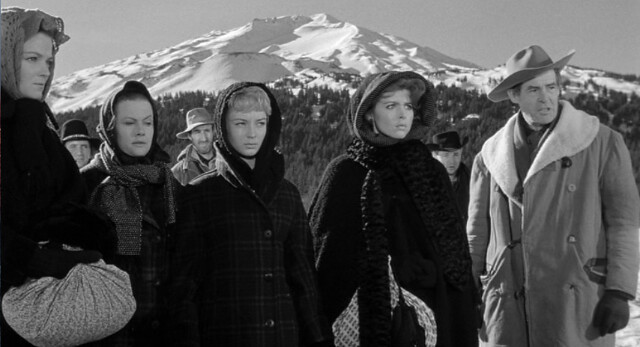
The self-righteous anger and violence has been a staple pathos for the Western genre. This tough male victimhood is as privileged and outdated as white supremacy movement that is rampant in this country. One can't deny that America is built on violence but no one wants to admit it. All highly regarded Westerns follow pretty much the same pathos - The Searchers, The Man Who Shot Liberty Balance, etc. Andre de Toth's Day of the Outlaw is no exception but it makes a hero out of Robert Ryan's gruffy rancher without ever firing a gun. So kudos for that.
Ryan plays Blaise (more like Blasé), a hardened rancher who's had enough of Crane, a farmer and husband of his former lover Helen (Tina Louise), encroaching his territory. Blaise has no qualms about shooting down Crane just on principle alone. But a group of outlaws, headed by former army captain Bruhn (Burl Ives), rolls into town, just in time for Blaise & Crane showdown and start terrorizing its twenty or so citizens of the small town. Bruhn's men are thirsty and lusty. But perhaps because he knows that he is dying, Bruhn promises the townsfolk that his men will not touch the booze and women, until they have secured a safe passage, away from trailing calvary. Blaise, knowing that Bruhn's death will commence raping and pillaging, urges the town's horse doctor to extract the bullet from Bruhn's chest and keep him alive as long as he can.
After a night of dancing and some molestation of women, Blaise decides to deceive the gang and lead them to certain death in the mountain, promising that there is a secret safe passage through the snowy mountains. Greedy and trigger happy, the gang starts to kill each other off.
Day of the Outlaw is a great western. Top notch acting from Ryan and Ives and Louise is a real beaut. Snowcapped vista also accentuates the harshness of the American west.